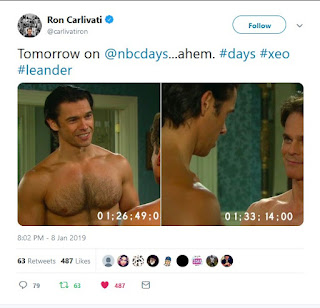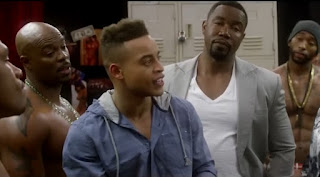Movie Review - The Ticket (2017)
Dan Stevens (Downton Abbey and Legion) stars as James Harvey, a man who does telemarketing at a real estate company somewhere in New York state. He's a man of faith, supposedly. He attends church, but after decades of blindness, having lost his sight as a child due to a pituitary problem, now he can see, and apparently what he sees is that he's not wealthy. He wants to change that, and his idea is to use the church to lure people into a real estate scheme.
Fluk is theorizing that materialism is mostly based on vision, seeing something and wanting it, but it only manifests in James buying a fancy car and fancy suits, not too fancy but nicer than the slubby stuff he used to wear. He never achieves having too much money to go crazy like in The Wolf of Wall Street. Fluk cuts short his upswing, so this idea is never carried to its logical conclusion. Clearly, it's not materialism as he just wants to be perceived as being rich and powerful.
Why he wants to be rich and powerful is never made clear. It's also never made clear why his greed or ambition is activated when he regains his sight. It suggests that blind people can't be greedy or ambitious, which isn't true. Quite frankly, nothing James does after getting his eye-sight back is anything he couldn't have done while blind. Besides being more independent like being able to drive, his main focus is his work scheme, which isn't dependent on him having sight.
It's ridiculous because you see James on a treadmill exercising after he gets his sight back, which suggests he needs it or wants it for some reason. The truth is Stevens is already lean and sexy. He was in good shape while he was blind, so I don't get why he thinks he needs the exercise now.
It would be one thing if we saw him doing things he couldn't do while blind like watching an IMAX film or looking at the sunrise. Aside from an exuberant opening, James never really enjoys the fact he has vision now. A sequence where maybe he goes sight-seeing even of places he's been while blind but now appreciating those places would've been great. But again, his sight truly is incidental in this movie.
Malin Akerman (Watchmen and The Final Girls) plays Samantha Harvey, his wife from whom he separates. When James splits from her, he suggests it's due to the fact that she doesn't like his independence or especially his newfound ambition or materialism. That suggestion would have been fine in any other film. It's not fine in this one. He should have split from his wife because he thought she was ugly or not attractive. The filmmakers try to make Akerman not the Swedish beauty she normally is, but she is miscast. His wife should have been uglier and that should have been an aspect of him getting his sight back the movie should have addressed head on.
Fluk might argue that that undertone or subtext is there, but I would argue that if it's subtext, it's buried, and that the subtext should have been bumped up to text, direct text. Without it and in conjunction with everything else, this movie makes his sudden ability to see inconsequential.
Not Rated but contains sexual situations and language.
Running Time: 1 hr. and 40 mins.












Comments
Post a Comment